The Iliad (Penguin Classics) Read online
Page 8
Peleus [Péel-yoos]. Father of Achilles, a great warrior in his day with his horses, armour and famous ash spear (all given to him by the gods at his wedding to the Sea-nymph THETIS). Now an old man living on his own back home in Phthia.
Phoenix [Fée-nix]. Ruler of the Dolopes and old friend of Achilles. Peleus made him Achilles’ tutor.
Sthenelus [Sthén-ell-us]. Son of Capaneus, attendant to Diomedes.
Talthybius [Tal-thíb-ee-us]. Chief herald to Agamemnon.
Telamon [Téll-am-on]. Father of (great) Ajax.
Teucer [T-yóo-sir]. Son of Telamon. Half-brother to the great Ajax. A fine bowman.
Thersites [Ther-síte-eez]. Only member of the rank-and-file to play a part in the Iliad, slapped down by Odysseus.
Tydeus [Tied-yoos]. Father of Diomedes, the hero of an earlier siege of Thebes.
TROJANS AND ALLIES OF TROY
The Trojan Royal Family (see 20.215–40)
Aeneas [Inn-ée-us]. Son of the goddess APHRODITE and mortal Anchises [Ank-éye-sees]. Second-in-command to Hector. The hero of Virgil’s Aeneid, a Roman epic (19 BC) about Aeneas leaving Ilium after it was sacked by Greeks and founding the Roman race in Italy.
Andromache [And-ró-mack-ee]. Daughter of Eétion, the ruler of Thebe [Thée-bee]. Wife of Hector and mother of Astyanax.
Antenor [Ant-ée-nor]. A Trojan leader who advised his countrymen to give up Helen.
Astyanax [Ast-éye-an-ax]. Son of Hector and Andromache.
Briseis [Briss-áy-iss]. Daughter of Briseus from Lyrnessus. When Achilles sacked the town, he took Briseis captive. Agamemnon subsequently took her from him to compensate himself for the loss of Chryseis.
Cassandra [Cass-ánd-ra]. Daughter of Priam and Hecabe. After the sack of Ilium, Agamemnon took her home with him, and she was murdered by his wife Clytaemnestra. She was a prophetess who, because she rejected the advances of APOLLO, was doomed always to tell the truth and never to be believed.
Chryseis [Cry-sáy-iss]. Daughter of Chryses [Crý-seez], the priest of APOLLO at Chryse [Crý-see] in Troy. She was captured at Thebe by Achilles and allotted to Agamemnon, who was forced by APOLLO’s plague to give her back to her father.
Deiphobus [Day-íff-obb-us]. Son of Priam and Hecabe. A Trojan leader. ATHENE likens herself to him when she deceives Hector into standing and fighting against Achilles.
Dolon [Dóll-on]. Son of Eumedes. A wealthy young Trojan who was very fond of horses.
Eétion [Ee-étt-ee-on]. Father of Andromache, killed (as his sons were) by Achilles.
Glaucus [Gl-ór-kus]. Son of Hippolochus. A Trojan ally from Lycia, second-in-command to his cousin Sarpedon.
Hecabe [Héck-a-bee]. Wife of Priam, to whom she bore many sons, including Hector, Paris, Helenus and Deiphobus.
Hector. Son of Priam and Hecabe. Married to Andromache (with a son Astyanax); leader of the Trojan and allied armies, and Troy’s greatest fighter. Scathing of his elder brother Paris.
Helenus [Héll-enn-us]. Son of Priam and Hecabe. Like his sister Cassandra, he was gifted with second sight.
Idaeus [Eye-dáy-us]. Chief herald to Priam.
Ilus [éye-lus]. Grandfather of Priam. Ilium is the ‘city of Ilus’.
Laomedon [Lay-ómm-edd-on]. Treacherous early ruler of Troy renowned for not keeping to agreements, for example to give Heracles his famous horses for rescuing his daughter from a sea-monster, or to pay POSEIDON for building the walls round Ilium.
Pandarus [Pánd-ar-us]. Son of Lycaon. An ally of Troy from Lycia. Expert, but treacherous, archer.
Paris. Son of Priam and Hecabe. Apparently junior to his brother Hector (but see under Hector). Homer refers throughout to his abduction of Helen as the cause of the war but makes only one passing reference to the famous judgement by Paris of the three goddesses, APHRODITE, HERA and ATHENE, when he was serving as a shepherd on Mount Ida [éye-da].
Polydamas [Poll-ídd-a-mus]. Son of Panthous. One of the ablest of the Trojan leaders. He is a cautious, clear-headed strategist whom Homer uses as a warning figure for Hector.
Priam [Pr-éye-am]. Son of Laomedon, and descendant of Dar-danus son of ZEUS (hence ‘Dardanian’). Aged ruler of Troy.
Sarpedon [Sar-pée-don]. Son of ZEUS and leader of the Trojan allies from Lycia.
GODS
APHRODITE [Aff-rod-éye-tee]. Daughter of ZEUS; mother of Aeneas; lover of the War-god ARES; a goddess primarily associated with sexual impulses. Since Paris selected her as the loveliest of the three goddesses, she fights on the Trojan side. Called ‘Cyprian’ because of her famous cult-centre on Cyprus.
APOLLO [A-póll-oh].Son of ZEUS and LE TO, also called Phoebus. God of prophecy, sickness and health, and stringed instruments (hence of the lyre and the bow). The sudden deaths of men (not by violence) are attributed to his arrows. He fights on the Trojan side.
ARES [Aír-eez]. Son of ZEUS and HERA; the god of war, called ‘most hateful’ of the gods by ZEUS. He fights on the Trojan side, and in the battle of the gods is ignominiously disposed of by ATHENE.
ARTEMIS [Árt-emm-iss]. Daughter of ZEUS and LETO, and sister of APOLLO; the goddess of hunting and wild animals. She used her arrows to administer a peaceful death for women. On the Trojan side.
ATHENE [Ath-ée-nee]. Daughter of ZEUS, also called PALLAS (‘Lady’?, ‘Mistress’?, ‘Youthful’?) ATHENE. Goddess of war, wisdom and the arts and crafts. Strongly pro-Greek because of her defeat in the judgement of Paris; works together with HERA against the Trojans. ‘Grey-eyed’ could mean ‘owl-eyed’, the owl being her special bird. ‘Triton-born’ may possibly mean that, after ZEUS gave birth to ATHENE from his head, she was then brought up by the River Triton in Greece. ‘Atrytone’ [A-trý-tonn-ee] remains unexplained.
CRONUS [Crónn-us]. Husband of RHEA [Rée-ah] and father of ZEUS, POSEIDON, HADES and HERA. He was deposed from power by ZEUS, who defeated him in battle and hurled him, with his TITAN supporters, deep underground. He came to power by slicing off his father URANUS’ genitals with a sickle (hence ZEUS is ‘son of sickle-wielding Cronus’).
DELUSION (in Greek atê [art-air]). Daughter of ZEUS. She is the personification of blind folly – the impulse to do something irrational and stupid, with disastrous consequences. See ‘Personification’ in Appendix 1.
EILEITHYIA [Ay-lay-thwée-ya]. Daughter of HERA. Goddess of labour in childbirth.
FURY/FURIES. Gods of the underworld who preserve the natural order of things, guard oaths and punish unnatural acts (including disrespect for parents).
HADES [Háy-deez]. Son of CRONUS and RHEA. God of the dead, who received the underworld as his portion when he and his brothers ZEUS and POSEIDON divided the world between them. Associated with horses.
HEBE [Hée-bee]. Daughter of ZEUS and HERA. Cup-bearer and handmaiden of the gods.
HEPHAESTUS [Heff-éye-stus]. Son of ZEUS and HERA. Master craftsman and architect of Olympus. Pro-Greek. In Homer he was born a cripple and thrown out of punished by him (see under ‘Heracles’). Goddess of marriage and motherhood. ‘White-armed’ perhaps because a fair skin was valued; ‘ox-eyed’ perhaps because she was associated with the cow in prehistoric ritual.
HERMES [Hér-meez]. Son of ZEUS and Maia. The ambassador of the gods, though in the Iliad IRIS is used more often than HERMES as go-between. Called ‘guide’, as he guided the dead down to HADES; called ‘slayer of Argus’, a many-eyed monster sent by HERA to watch over 1o, a young woman ZEUS loved. ZEUS ordered HERMES to get rid of it.
IRIS (= ‘rainbow’). Messenger of the gods.
LETO [Lée-toe]. Mother of APOLLO and ARTEMIS by ZEUS.
MUSE. Goddess of memory, who helps the poet sing about events from long ago.
OCEAN. The ancient god whose great river, Greeks believed, circled the world.
POSEIDON [Poss-áy-don]. Son of CRONUS and RHEA, and a younger brother of ZEUS. He received the sea as his domain when the three brothers, ZEUS, POSEIDON and HADES divided the world by lot between them. God of elemental forces, for example earthquakes. Pro-
Greek because he built the walls of Ilium for the treacherous Trojan ruler Laomedon, but received no ‘pay’ for his work.
STRIFE (in Greek, eris). Sister of ARES the War-god-another personification. It was she who threw the golden apple marked ‘to the most beautiful’ among the gods (see p. xiii).
THETIS [Thétt-iss]. Daughter of the Old Man of the Sea (Nereus). A Sea-nymph who was married to a mortal, Peleus, father of her only child, Achilles. Always at her son’s side when he needs help.
TITANS [Tíe-tuns]. Powerful gods who supported CRONUS in his fight against his son ZEUS. They were thrust deep underground when ZEUS defeated them.
XANTHUS [Xán-thus]. God of the Trojan River XAN-THUS, called ‘Scamander’ by mortals; also the name of a river in Lycia.
ZEUS [Z-yoos]. Son of CRONUS and RHEA. Sky and Weather-god (hence ‘lord of the lightning-flash’, ‘cloud-gatherer’, ‘far-thunderer’ and so on). Strongest of all the gods and therefore the supreme Olympian deity, the ‘Father’. He agrees to support Achilles in his feud with Agamemnon and shows some sympathy for the Trojans, in particular Hector and Priam.
Further Reading
THE ILIAD
D. L. Cairns (ed.), Oxford Readings in Homer’s ‘Iliad’ (Oxford: Oxford University Press, 2001).
M. W. Edwards, Homer: Poet of the ‘Iliad’ (Baltimore: Johns Hopkins University Press, 1987).
S. L. Schein, The Mortal Hero: An Introduction to Homer’s‘Iliad’ (Berkeley: University of California Press, 1984).
S. Shankman (ed.), The ‘Iliad’ of Homer, transl. Alexander Pope (Harmondsworth: Penguin, 1996), complete with Pope’s wonderful ‘Observations’ and ‘Poetical Index’.
O. P. Taplin, Homeric Soundings: The Shaping of the ‘Iliad’ (Oxford: Clarendon Press, 1992).
HOMER
H. W. Clarke, Homer’s Readers: A Historical Introductionto the ‘Iliad’ and ‘Odyssey’ (Newark: Associated University Presses, 1981).
J. Griffin, Homer on Life and Death (Oxford: Clarendon Press, 1980).
J. B. Hainsworth, The Idea of Epic (Berkeley: University of California Press, 1991).
J. Latacz, Homer: His Art and his World (Ann Arbor: University of Michigan Press, 1996).
E. V. Rieu, revised by D. C. H. Rieu, Homer: The Odyssey (Harmondsworth: Penguin, 1991; new edition 2003).
COMMENTARIES
On the Greek
G. S. Kirk (General Editor), The Iliad: A Commentary (6 vols., Cambridge: Cambridge University Press, 1985–93).
W. Leaf, The Iliad (2 vols., London: Macmillan, 1886).
M. M. Willcock, The ‘Iliad’ of Homer (2 vols., London: Macmillan, 1978–84).
In translation
Peter Jones, Homer’s ‘Iliad’: A Commentary on Three Translations (London: Duckworth, 2003). The translations in question are this one; Martin Hammond, Homer: The Iliad (Harmondsworth: Penguin, 1987); and Richard Lattimore, The Iliad of Homer (Chicago: University of Chicago Press, 1951).
N. Postlethwaite, The ‘Iliad’ of Homer: A Commentary (Exeter: Exeter University Press, 2000).
M. M. Willcock, A Companion to the ‘Iliad’ (Chicago: University of Chicago Press, 1976).
LEARNING ANCIENT GREEK
Peter Jones, Learn Ancient Greek (London: Duckworth, 1998), a simple introduction, based on a series in the Daily Telegraph.
CLASSICS TODAY
There are two associations for members of the general public who live in the UK: Friends of Classics. This is for adults with a love of the ancient world, however creaky their knowledge of it. It organizes seminars, social events and outings, and produces a biennial colour magazine (ed. Peter Jones). Write to Jeannie Cohen, 51 Achilles Road, London NW6 1DZ
The Classical Association. The C A organizes lectures at local universities, school reading competitions and an AGM, and publishes regular newsletters. Write to The CA, Institute of Classical Studies, Senate House, Malet Street, London WC 1E 7HU.
For details of classical summer schools for students and adults in ancient Greek, Latin, and Greek and Roman history and culture, write to: The Joint Association of Classical Teachers, Institute of Classical Studies, Senate House, Malet Street, London WC 1E 7HU.
Preliminaries
CONVENTIONS
1. On my use of ‘Greeks’, please see Notes on this Revision, 5.
2. In the summaries to each book and the marginal notes, and all other sections, Greek names and places are printed in roman type (e.g. Achilles, Argos), Trojan names and places are in italics (e.g. Hector, Ilium). Since Troy had many allies (cf. 2.804, 4.437), ‘Trojan’ covers everyone on the Trojan side, wherever they come from. The names of gods are printed in capitals (ZEUS), pro-Trojan gods in italic capitals (APOLLO).
3. There are many ways of representing Greek names in English.Rieu used the traditional Anglicized forms, though he opted to follow Homer when he had a choice of ending a name with -e or -a (thus ATHENE, not ATHENA). I have followed his practice throughout, though I have changed ZEUS’ wife from HERE to HERA to avoid confusion, and have converted the Greek hero Aias (an exact transliteration of the Greek name) back to his Anglicized name Ajax, which Rieu avoided because in his time that was the name universally associated with a popular brand of kitchen cleaner.
Other translations and books often prefer to use forms that more nearly represent ancient Greek, for example not ‘Achilles’ but ‘Akhilleus’ or ‘Achilleus’. On the whole issue, see my An Intelligent Person’s Guide to Classics (London: Duckworth, 2000), pp. 138–9.
A NOTE ON HOMER’S STYLE
Homer constantly gives characters and objects little descriptions. People are always being called for example ‘godlike’, ‘lord’, ‘lord of men’, and so on. More specifically, Achilles is ‘swift-footed’, ZEUS is a god ‘who drives the storm-cloud’, APOLLO is the ‘Archer-god’ or ‘lord of the silver bow’ and HERA ‘white-armed’. Ships are ‘hollow’ or ‘swift’ (even when beached, like a parked ‘fast car’), Ilium a town ‘with fine walls’, and so on.
‘Son of is especially popular, since fathers are important figures in Homer’s world. So ZEUS is ‘son of Cronus’, Achilles ‘son of Peleus’, Agamemnon and Menelaus ‘son (s) of Atreus’. Humans can even be credited with a divine father or mother, a high compliment. ‘Olympian-born’ means (literally) ‘born of a god’ and ‘Olympian-bred’ means ‘brought up by a god’ (see ‘Some general epithets’ in Appendix 1).
As well as these small repeated descriptions, whole sentences, sometimes whole speeches or scenes, are verbally repeated. Speeches nearly always end ‘So X spoke’ or ‘With these words’. These repetitions are intentional. They are all part of Homer’s way of composing and are there to be enjoyed (see Introduction, p. xxviii, for the technical explanation) .
For ‘supplication’ or ‘entreaty’, common throughout the Iliad, see the Index.
* In this Introduction, please note that Trojan names and places are printed in italics (e.g. Hector); gods are in capitals (ZEUS), pro-Trojan gods in italic capitals (APOLLO). See pp. xli-xlvi for notes to the Introduction.
* I am not implying in what follows that we really know which of them Homer wrote first.
* The Achaeans attached even more importance than we do to the proper disposal of their dead. See the ghost of Patroclus on the subject (Book 23).
* But the gods do not retaliate by laughing at mankind. On the contrary, except for some light-hearted backchat with their favourites (e.g. Athene and Diomedes, 5; or Athene and Odysseus, Od. 13), they take men seriously and regard them as miserable though fascinating creatures. See Apollo on the subject, 21, or Zeus, 20 and 17.

 The Odyssey
The Odyssey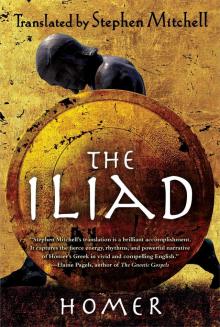 The Iliad
The Iliad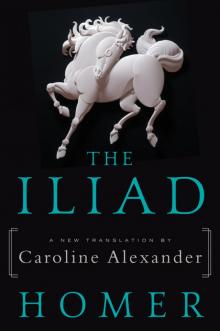 The Iliad (Trans. Caroline Alexander)
The Iliad (Trans. Caroline Alexander)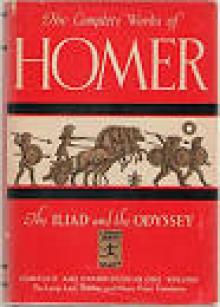 Complete Works of Homer
Complete Works of Homer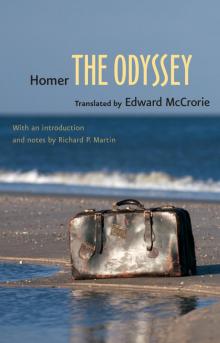 The <I>Odyssey</I>
The <I>Odyssey</I>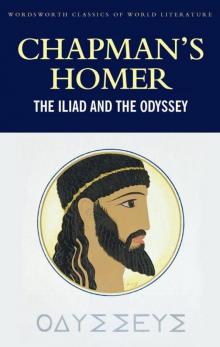 The Iliad and the Odyssey (Classics of World Literature)
The Iliad and the Odyssey (Classics of World Literature)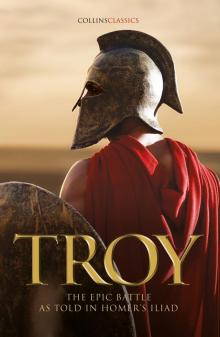 Troy
Troy The Iliad (Penguin Classics)
The Iliad (Penguin Classics)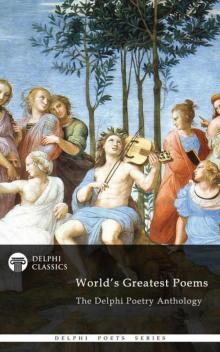 Delphi Poetry Anthology: The World's Greatest Poems (Delphi Poets Series Book 50)
Delphi Poetry Anthology: The World's Greatest Poems (Delphi Poets Series Book 50)